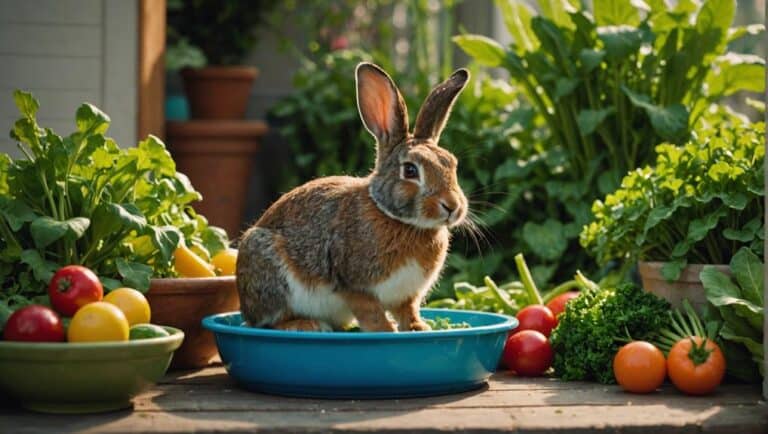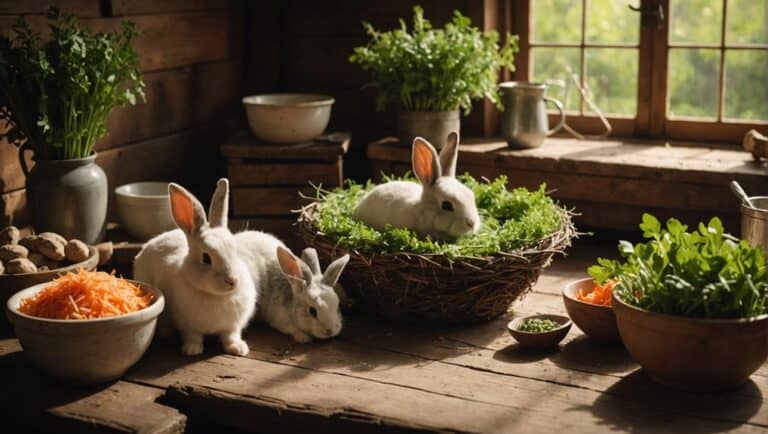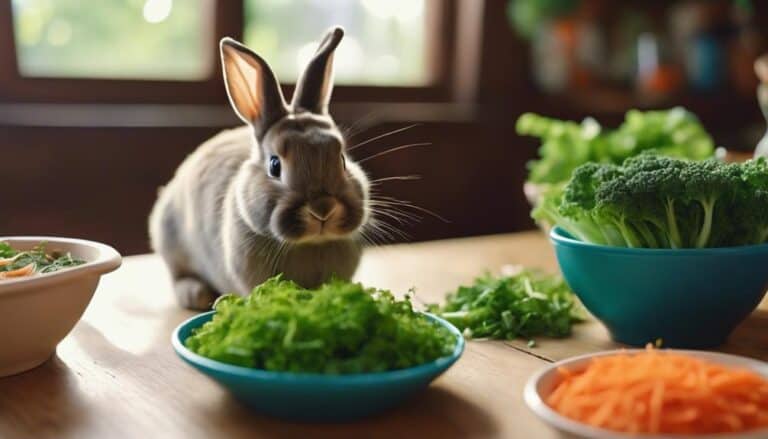Just as a garden flourishes with the right care, your baby rabbit's health thrives on a balanced diet of wholesome snacks. You'll want to focus on incorporating fresh vegetables, especially dark leafy greens, that can enrich their nutritional intake. However, it's important to understand not only which snacks are beneficial but also how to introduce them gradually. What you choose to feed your little companion can greatly impact their growth and well-being, leading to a discussion on the best options available.
Contents
Importance of Fresh Veggies
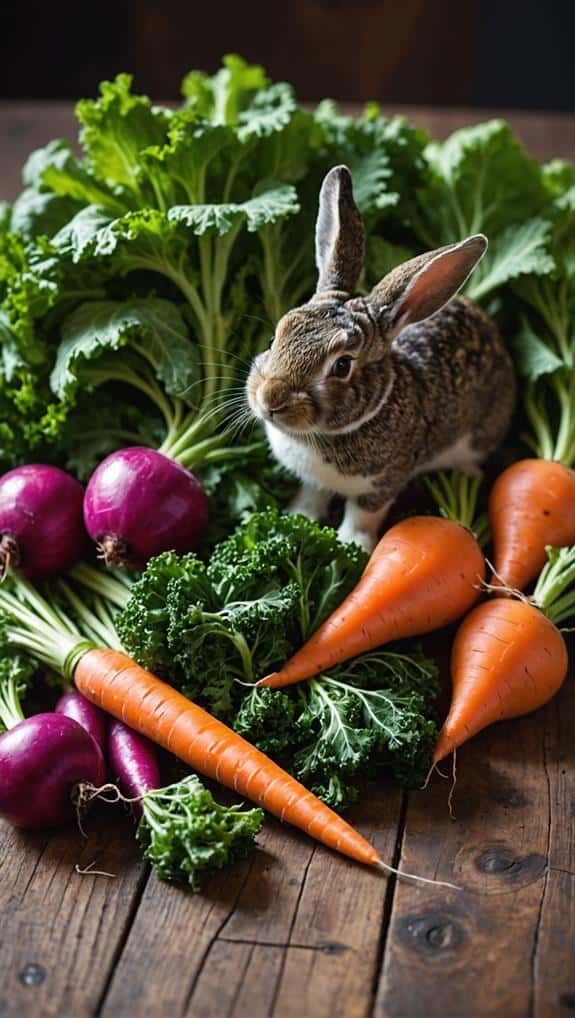
Introducing fresh vegetables into your baby rabbit's diet is essential for their health and development. Starting this process at around 6-8 weeks old helps support their digestive health and provides essential nutrients. A gradual introduction not only aids in adjustment but also aligns with the recommended practices for evolving to a healthy diet, guaranteeing your rabbit experiences fewer digestive disturbances successful adapting tips.
When you introduce fresh vegetables, remember to do so gradually—this approach allows you to monitor for any signs of gastrointestinal distress.
Dark leafy greens, such as basil, dandelion greens, and romaine lettuce, are excellent choices and should make up about 10-15% of your young rabbit's daily intake. However, it's important to limit new vegetable introductions to one type at a time. This strategy helps you identify any adverse reactions and guarantees your baby rabbit adapts well to their new diet.
While fresh veggies are important for balanced nutrition, they should complement a diet primarily based on high-quality hay and pellets. Be mindful of overfeeding fresh greens, which can lead to digestive upset.
A good guideline is to offer about ¼ cup of fresh greens per 2 pounds of body weight. With care and attention, you can help your baby rabbit thrive with a nutritious diet.
Suitable Leafy Greens
When selecting suitable leafy greens for your baby rabbit, it's important to focus on dark leafy vegetables that provide essential nutrients for their growth and development. Greens like kale, parsley, romaine lettuce, and cilantro are excellent choices. They're packed with vitamins and minerals that support your young rabbit's health and should form the majority of their diet, as hay and grass are also essential for rabbit dietary essentials.
To prevent digestive issues, introduce these leafy greens gradually, offering only one new type at a time. Baby rabbits have sensitive digestive systems, so it's essential to serve these greens in moderation, constituting about 10-15% of their overall diet. This gradual approach helps them acclimate to new foods without discomfort.
Always verify that the leafy greens you provide are thoroughly washed and dried before serving. This step is critical to prevent contamination and verify they're safe for your little companion.
Aim to offer a variety of leafy greens daily to promote a well-rounded diet, keeping your baby rabbit engaged and happy. By doing so, you're not only enriching their diet but also supporting their overall health and well-being as they grow.
Best Root Vegetables
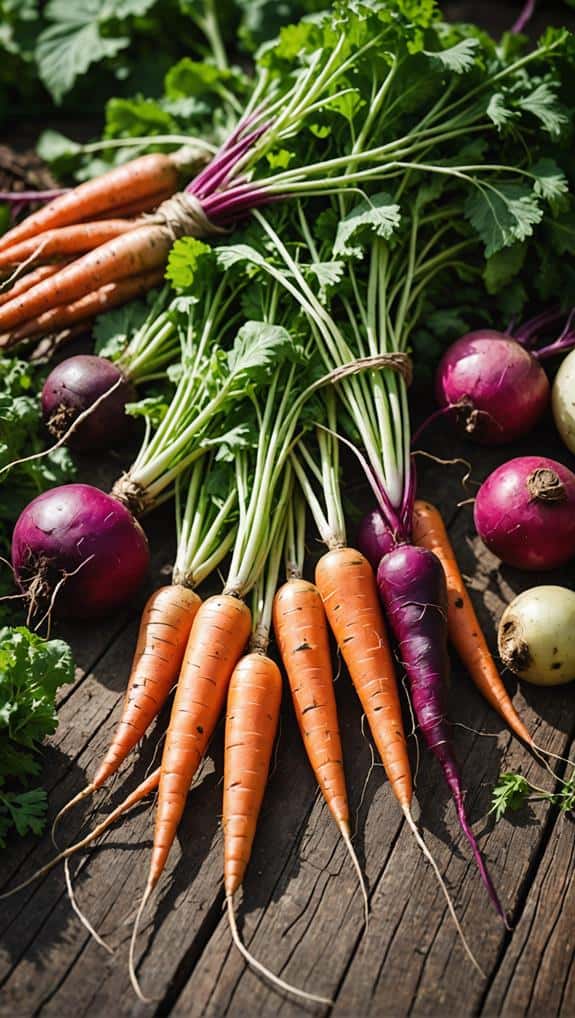
When it comes to root vegetables for your baby rabbit, understanding their nutritional benefits is vital. Including root vegetables can provide additional vitamins and minerals that complement their primary diet of hay and greens.
You'll want to prepare them safely and introduce varieties like carrots, turnips, and beetroot in moderation to keep your pet healthy.
Remember, a balanced diet is imperative for your rabbit's well-being, so don't forget to include staples like Timothy hay essential for rabbit health.
Let's explore the best root options that can enhance your rabbit's diet while ensuring balanced digestive health.
Nutritional Benefits of Roots
Root vegetables play an essential role in the diet of baby rabbits, offering a wealth of nutritional benefits that support their growth and health. Incorporating these root vegetables, like carrots, beetroot, and turnips, into your rabbit's diet can enhance their overall well-being.
Carrots, while a popular choice, should only make up about 10% of a baby rabbit's diet due to their higher sugar content. Moderation is key to preventing obesity.
On the other hand, beetroot is a low-calorie option packed with antioxidants and important vitamins, such as B6, which bolster immune function and overall health.
Turnips are another fantastic addition, providing a balanced mix of vitamins A and C along with essential fiber. This combination promotes healthy digestion, essential for your baby rabbit's development.
Always remember to wash root vegetables thoroughly, serving them raw and cut into small pieces to facilitate safe consumption.
Safe Preparation Methods
One of the best ways to guarantee your baby rabbit enjoys nutritious root vegetables is by preparing them safely and thoughtfully.
Start by incorporating fresh leafy greens into your rabbit's diet, as these should form the foundation before you introduce root vegetables. When you're ready to add these nutrient-rich options, consider carrots, turnips, and parsnips.
Remember, carrots are high in sugar, so treat them more like a fruit and serve in small portions.
Always thoroughly wash root vegetables to remove any pesticides or residues. This step is essential for your baby rabbit's sensitive system.
Once washed, slice the vegetables into small pieces. This makes them manageable for your little friend and encourages natural foraging behavior.
Introduce new root vegetables gradually, one at a time, to monitor for any adverse reactions or digestive issues. This careful approach guarantees your baby rabbit can adapt without feeling overwhelmed.
Recommended Root Varieties
Adding a variety of root vegetables to your baby rabbit's diet can enhance their nutrition while keeping mealtime interesting. Root vegetables are a fantastic source of essential vitamins and minerals, but remember to serve them in moderation due to their sugar content.
Carrots are often a favorite, but they should be treated as a treat rather than a staple. Offer them in small amounts, about 1-2 tablespoons per day, to avoid excessive sugar intake.
Parsnips are another great option; they provide fiber and nutritional diversity without the high sugar levels. You can introduce them gradually to help your baby rabbit adjust.
Turnips and radishes also make suitable additions, adding variety and important nutrients to their meals. As with other root vegetables, introduce these slowly to prevent digestive upset.
Always wash and chop root vegetables into small, manageable pieces to promote safe consumption and prevent choking hazards.
Introducing Herbs Gradually
When introducing herbs to your baby rabbit, start by selecting safe options like basil, cilantro, and parsley around 6-8 weeks of age.
It's vital to monitor their digestive reactions carefully, offering only one new herb at a time and waiting 24-48 hours before adding more.
Keeping portions to about 1 tablespoon per 2 lbs of body weight will help maintain their health while enhancing their diet with essential nutrients.
Herb Selection Tips
Introducing herbs to your baby rabbit's diet can be a delightful experience, but it's important to do so gradually. This careful approach helps prevent digestive upset while allowing you to monitor your bunny's reactions to new foods.
Here are some essential tips for introducing herbs:
- Start Slow: Begin with just a few leaves of one herb at a time, like parsley or cilantro. This allows your baby rabbit to adjust and helps you observe any adverse effects.
- Choose Organic: Always opt for organic herbs free from pesticides. Chemicals can harm your bunny's sensitive digestive system, so prioritize quality in what you offer.
- Observe Reactions: After introducing a new herb, watch your rabbit closely for any signs of discomfort or allergies.
Dandelion greens are a great choice for their dietary benefits, but like all fresh greens, they should be given in moderation.
Monitoring Digestive Reactions
Your baby rabbit's digestive health is paramount when adding new herbs to their diet. To guarantee a smooth shift, start by introducing a small amount of a single herb, like basil or dandelion greens. This approach lets you monitor any digestive reactions closely.
Observe your rabbit for signs of discomfort, such as decreased appetite, diarrhea, or lethargy, which may indicate an adverse reaction to the new addition.
Wait a few days before introducing another herb, allowing you to pinpoint potential allergies or sensitivities. Keeping a record of each herb introduced along with any reactions helps you create a reliable reference for future dietary adjustments.
This is essential for maintaining your rabbit's health and guaranteeing they benefit from the added nutrients without experiencing discomfort.
Safe Fruits for Treats
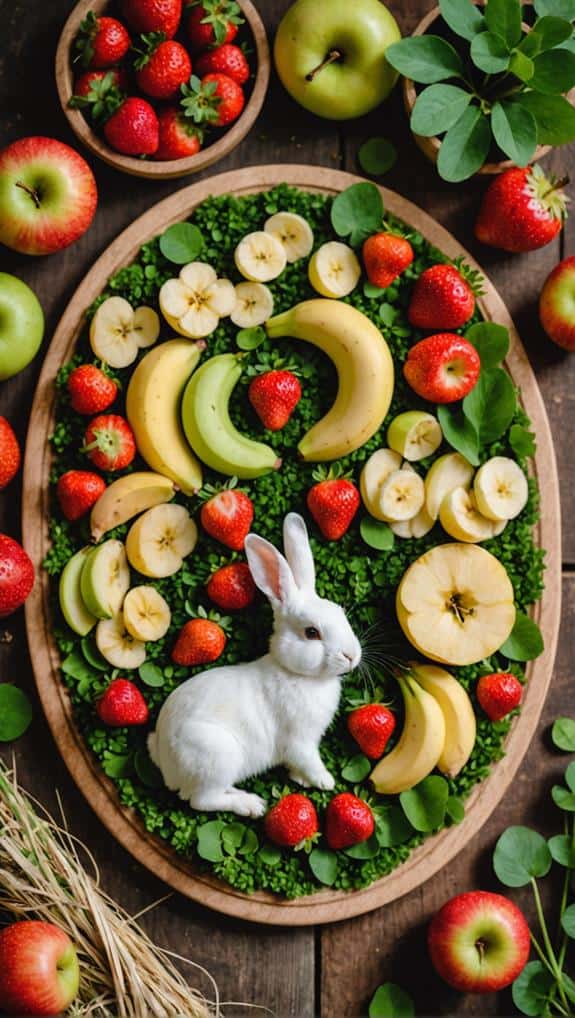
Treating your baby rabbit to safe fruits can be a delightful way to bond and add variety to their diet. Incorporating fresh fruits as treats not only makes mealtime exciting but also supports their healthy diet. Here are some safe fruit options to take into account:
- Apples (without seeds) – A crunchy treat that many rabbits enjoy.
- Blueberries – Packed with antioxidants, these tiny fruits are a perfect nibble.
- Strawberries – These sweet treats are a favorite for many baby rabbits.
When introducing new foods, remember to offer these fruits in small amounts. It's important to monitor reactions, as baby rabbits have sensitive digestive systems.
Limit fruit treats to just 1-2 tablespoons per day to prevent any digestive issues. Avoid high-sugar fruits in excess; instead, view them as special treats rather than staples in their diet.
Always verify the fruits are fresh, thoroughly washed, and free from any additives or chemicals. By carefully selecting safe fruits and introducing them thoughtfully, you can enrich your baby rabbit's life while promoting their health and happiness.
Portion Control Guidelines
While adding safe fruits to your baby rabbit's diet can enhance their mealtime experience, it's important to pay attention to portion control to guarantee their health and well-being.
For baby rabbits, limit high-sugar treats like fruits and vegetables to no more than 1 tablespoon per day. This helps prevent digestive issues that can arise from excessive sugar intake.
When it comes to pellets, aim for about 1/4 cup per 2 lbs of your rabbit's body weight daily during their growth phase.
Fresh leafy greens should be introduced gradually, with small portions to avoid overwhelming their sensitive digestive systems. Remember, treats and snacks shouldn't exceed 10% of their overall diet to maintain balanced nutrition.
Regularly evaluating your baby rabbit's weight and overall health is essential. If you notice any changes, adjust the snack portions accordingly to support their best growth and development.
Signs of Digestive Issues
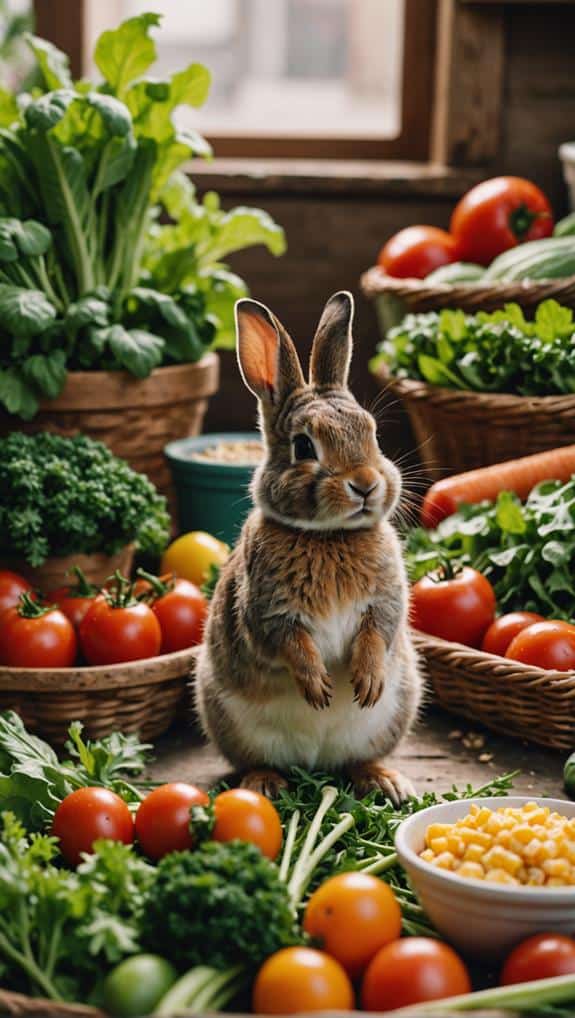
Often, baby rabbits can show subtle signs of digestive issues that require your attention. It's vital to recognize these signs early to guarantee their health and well-being. Here are some key indicators to watch for:
- Decreased Appetite: If your baby rabbit suddenly shows a reluctance to eat, it could indicate discomfort or digestive distress.
- Watery Droppings: Soft or watery droppings may result from overconsumption of fresh foods, disrupting their sensitive digestive system.
- Lethargy and Abnormal Behaviors: If your rabbit is unusually inactive, excessively grooming, or sits hunched, these behaviors can signal serious problems.
A sudden lack of droppings is a significant warning sign that requires immediate veterinary attention, as young rabbits are at risk of rapid deterioration due to gastrointestinal stasis.
If your baby rabbit refuses food for more than a day, it's important to seek veterinary assistance right away.
Being vigilant about these signs will help you provide the best care and support for your rabbit's digestive system. Always prioritize their health and don't hesitate to consult with a veterinarian when in doubt.
Monitoring Snack Reactions
Recognizing signs of digestive issues in baby rabbits is just the first step in guaranteeing their well-being; monitoring their reactions to new snacks is equally important. When you introduce new snacks, offer only one item at a time. This way, you can easily identify any potential adverse reactions.
It's vital to monitor your rabbit's behavior closely for signs of digestive upset, such as changes in appetite, loose droppings, or lethargy.
Make sure to record reactions to each snack introduced, maintaining a clear reference to avoid repeating any that caused issues. Gradually increase the portion size of the new snack over several days to assess tolerance and prevent sudden digestive problems.
If your baby rabbit exhibits persistent signs of distress or discomfort after eating, don't hesitate to consult a veterinarian.
Your attentive monitoring can help guarantee a happy, healthy bunny. By being proactive and compassionate in your approach, you're setting the stage for a nutritious diet that supports their growth and well-being.
Creating a Balanced Diet

Creating a balanced diet for your baby rabbit is imperative for their growth and overall health. During the first 6-8 weeks, your little one should rely on mother's milk. As they shift to solid food, it's essential to introduce a variety of healthy options. Here's a simple guide to guarantee a balanced diet:
1. Hay: Provide unlimited access to Alfalfa hay, which is rich in protein and calcium, fundamental for growing rabbits.
Gradually switch to grass hay like Timothy or Meadow hay by 6-7 months.
2. Pellets: Offer an egg cup of alfalfa-based pellets daily.
These nutrient-rich foods support healthy development and provide necessary vitamins and minerals.
3. Fresh Greens: Slowly introduce fresh leafy greens, such as basil and dandelion greens, in moderation.
This variety enhances your baby's diet while avoiding digestive issues from sudden changes.
Don't forget to maintain constant access to fresh water, which is critical for hydration and digestive health.
Final Thoughts
Incorporating wholesome snacks into your baby rabbit's diet is essential for their growth and well-being. Did you know that a diet rich in fresh veggies can improve your rabbit's overall health and longevity by up to 25%? By focusing on appropriate leafy greens, root vegetables, herbs, and safe fruits, you can create a balanced diet that supports their nutritional needs. Always pay attention to their reactions and adjust accordingly to guarantee they thrive and stay happy.

